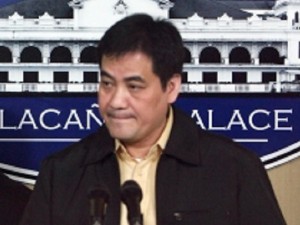Malacañang on Thursday credited President Benigno Aquino for the rise in the country’s competitiveness, after the Philippines jumped to the 65th spot in this year’s Global Competitiveness Index (GCI) from 10 ranks down.
“President Aquino’s presence in government is the number one institutional reform in this country and, hence, you see the competitiveness of our country going up,” presidential spokesperson Edwin Lacierda told Palace reporters.
Taking a leaf from the US Democratic Party convention, he said: “Are we satisfied? Are we happy? Yes, we are happy. Are we satisfied? No. Can we do something … will we try to improve it? In the words of (US) President (Barack) Obama, ‘Yes, we can.’”
Lacierda singled out the “leadership by example” of President Aquino as being instrumental for the new assessment.
“The fact that he is clearly known to the world as not susceptible to corruption is a big incentive,” said Lacierda. This, he added, “is in and of itself an institutional reform to governance.”
Budget Secretary Florencio Abad also welcomed the country’s performance in the GCI for 2012-2013, noting that since the Aquino administration took over in 2010, the Philippines had leaped by 20 places among 144 countries, from 85th in the 2010-2011 GCI.
‘Most improvement’
Abad said that the index cited the Philippines as among the countries which had been showing the “most improvement,” particularly in the quality of institutions (23 places up from last year to 94th) and the macroeconomic environment (18 places up from last year to 36th).
“President Aquino had said in his State of the Nation Address in July: ‘What used to be impossible is now possible.’ In partnership with the private sector, civil society and other stakeholders, the government will up the ante in reform, that is, to make public institutions resilient to corruption and effective enablers of our country’s competitiveness,” Abad said.
Lacierda also cited other reforms initiated by the President, such as the elimination of red tape in business process licensing systems and increased revenue collections by the national government and local government units (LGUs).
“We also have the Philippine Business Registration, which is for the national government, and also for the local governments we have, through (the late) Secretary Jesse Robredo, the Seal of Good Housekeeping,” Lacierda said.
Robredo’s legacy
Robredo had instituted the Seal of Good Housekeeping to LGUs that advanced the primacy of performance, accountability and transparency.
The late DILG chief had issued a circular which provided that LGUs that qualified for the seal would be entitled to a cash incentive to finance administrative and procurement reforms and development projects particular to the needs of the municipality.
Lacierda disclosed that 748 LGUs had streamlined their business process licensing systems in the two-year period since Mr. Aquino assumed office.
